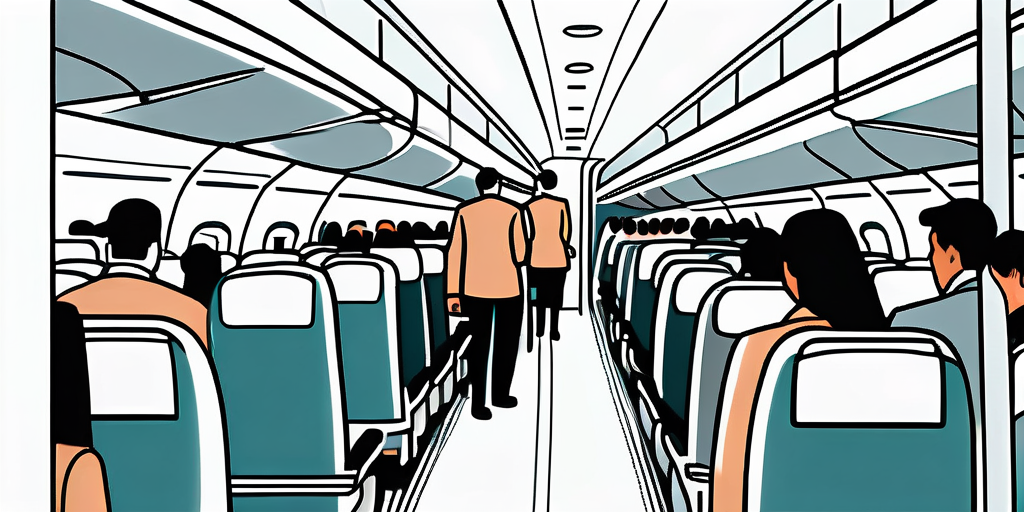The Impact of Overbooking Flights on Passengers and Airlines
nderstand the ins and outs of overbooking flights. Explore the causes, consequences, and strategies for dealing with overbooked flights.
Overbooking flights has become a common practice in the airline industry, but its impact on both passengers and airlines is significant. Understanding the concept of overbooking and why airlines choose to implement it is crucial in order to grasp its consequences. Furthermore, mitigating these consequences and finding strategies to deal with overbooking is essential for a smooth travel experience for passengers and maintaining a positive reputation for airlines.
Understanding Overbooking in the Airline Industry
Overbooking refers to the practice of selling more seats on a flight than the actual capacity of the aircraft. This may seem counterintuitive, but airlines do it for various reasons. By intentionally overselling seats, airlines can optimize their revenue and maximize their profit. It is based on the statistical likelihood that a certain number of passengers won't show up for their flight.

The Concept of Overbooking
Overbooking is built on the assumption that there will be a certain percentage of no-show passengers on any given flight. Airlines rely on historical data and algorithms to calculate the expected number of no-shows to determine the optimal number of seats to oversell. In theory, this should result in a full flight while minimizing the number of empty seats.
Moreover, overbooking also allows airlines to offer lower ticket prices to consumers. By overselling seats, airlines can spread their fixed costs over a greater number of passengers, enabling them to offer competitive fares. This strategy benefits both the airlines, by maximizing revenue, and the passengers, by providing more affordable travel options.
Why Airlines Overbook Flights
Airlines overbook flights to compensate for potential no-shows and ensure maximum revenue. The profit margins in the airline industry are notoriously slim, and overbooking allows airlines to hedge against financial losses caused by empty seats. By overselling flights, airlines can reduce the impact of last-minute cancellations or passengers who fail to arrive.
Furthermore, overbooking can also help airlines manage operational efficiency. By filling up flights to near capacity, airlines can operate more efficiently, reducing the cost per available seat mile. This optimization of resources benefits the airline's bottom line and can contribute to the overall sustainability of the business in a highly competitive industry.
The Consequences of Overbooking for Passengers
While overbooking may benefit airlines financially, it can have negative consequences for passengers. Being involuntarily bumped from a flight can cause stress and frustration, leading to an overall negative travel experience.

The Stress of Being Bumped
Being bumped from a flight can be a stressful experience for passengers. It can disrupt travel plans, cause delays, and result in missed connections for those on tight schedules. Additionally, passengers may have to deal with finding alternative transportation or accommodation arrangements, which can be both time-consuming and expensive.
Furthermore, the uncertainty and lack of control that come with being bumped can add to the stress levels of passengers. Not knowing when they will be able to reach their destination or how they will be compensated for the inconvenience can create additional anxiety and frustration.
Financial Implications for Passengers
Being involuntarily bumped from a flight can also have financial implications for passengers. They may miss out on important meetings or events, leading to potential financial losses. Additionally, passengers may incur expenses for alternative transportation, accommodation, or meals while waiting for the next available flight.
In some cases, passengers may also face challenges in claiming compensation for being bumped from a flight. Navigating the airline's policies and procedures for reimbursement can be a time-consuming and frustrating process, adding to the financial burden already imposed on passengers.
Impact on Passenger Trust and Loyalty
Overbooking can erode passenger trust and loyalty towards an airline. When passengers are bumped from a flight despite holding a confirmed reservation, it can lead to a loss of faith in the airline's reliability and customer service. This negative experience may prompt passengers to choose a different airline for future travel, resulting in potential financial losses for the airline.
Moreover, the proliferation of social media platforms has amplified the impact of negative experiences with overbooking. Passengers who feel mistreated or undervalued by an airline are more likely to share their grievances online, potentially damaging the airline's reputation and deterring others from booking with them in the future.
The Effects of Overbooking on Airlines
While overbooking may benefit airlines in terms of revenue, there are also potential consequences that they should consider.
 Overbooking is a practice that involves selling more tickets than the available seats on a flight. This strategy allows airlines to maximize seat occupancy and minimize empty seats, ultimately increasing their revenue. However, the success of overbooking relies on accurately predicting the number of no-shows. If the number of no-shows is significantly lower than expected, the airline may face the opposite scenario – having more passengers than available seats.
Overbooking is a practice that involves selling more tickets than the available seats on a flight. This strategy allows airlines to maximize seat occupancy and minimize empty seats, ultimately increasing their revenue. However, the success of overbooking relies on accurately predicting the number of no-shows. If the number of no-shows is significantly lower than expected, the airline may face the opposite scenario – having more passengers than available seats.
When faced with an overbooked flight, airlines must find alternative solutions for the excess passengers. This can involve compensating bumped passengers, finding alternative flights, and managing customer dissatisfaction. These additional costs can quickly add up, impacting the airline's financial performance.
Financial Gains and Losses
If done correctly, overbooking can result in financial gains for airlines. By maximizing seat occupancy and minimizing empty seats, airlines can increase their revenue. However, if the number of no-shows is significantly lower than expected, the airline may face the opposite scenario – having more passengers than available seats. This can lead to additional costs, such as compensating bumped passengers, finding alternative flights, and managing customer dissatisfaction.
Furthermore, overbooking can also have an impact on an airline's overall profitability. While the practice of overbooking aims to maximize revenue, it is essential to strike a balance. Overbooking too aggressively can result in a higher number of bumped passengers and potential legal implications, which can ultimately outweigh the financial gains.
The Role of Overbooking in Airline Reputation
Overbooking can significantly impact an airline's reputation. If mishandled, it can create negative publicity and damage the brand image. News stories of passengers being forcibly removed from flights can spread quickly on social media, creating a public relations nightmare for the airline. Maintaining a positive reputation is vital for airlines to attract and retain customers.
Customer satisfaction plays a crucial role in an airline's reputation. When passengers are bumped from flights due to overbooking, it can lead to frustration and disappointment. Airlines must handle these situations with care, providing clear communication, compensation, and alternative solutions. By prioritizing customer satisfaction, airlines can mitigate the negative impact of overbooking on their reputation.
Legal Implications for Airlines
Overbooking can also result in legal implications for airlines. Regulations vary by country, but airlines may be required to compensate passengers who are bumped from flights involuntarily. Failure to comply with these regulations can result in financial penalties and further damage to the airline's reputation. Additionally, some passengers may choose to take legal action against the airline for the inconvenience and financial losses they suffered.
It is crucial for airlines to understand and comply with the legal requirements surrounding overbooking. By doing so, they can avoid potential legal battles and maintain a positive relationship with their customers. Implementing effective policies and procedures to handle overbooking situations can help airlines navigate the legal landscape and minimize the risk of facing legal consequences.
Mitigating the Impact of Overbooking
While completely eliminating overbooking may not be feasible, there are strategies and policies that can help reduce its negative impact on passengers and airlines.
Overbooking, a common practice in the airline industry, is a delicate balancing act that aims to maximize revenue while minimizing the inconvenience to passengers. However, the consequences of overbooking can be significant, ranging from disgruntled passengers to damaged reputations. To address these concerns, airlines have implemented various strategies to ensure fair overbooking and minimize the chances of involuntary bumping.
Strategies for Fair Overbooking
Airlines can adopt fair overbooking strategies that prioritize passenger rights and minimize the chances of involuntary bumping. This includes using more accurate algorithms to determine the optimal number of oversold seats, offering voluntary bumping incentives, and ensuring transparent communication with passengers about their rights and potential compensation.
By utilizing advanced algorithms, airlines can better predict the likelihood of no-shows and adjust their overbooking practices accordingly. This allows for a more precise calculation of the number of oversold seats, reducing the need for involuntary bumping. Furthermore, offering voluntary bumping incentives, such as travel vouchers or upgrades, not only provides passengers with an opportunity to benefit from the situation but also helps airlines manage the number of passengers on each flight more effectively.
Transparent communication is also crucial in mitigating the impact of overbooking. Airlines should clearly inform passengers about their rights in the event of involuntary bumping, including compensation options and alternative travel arrangements. This ensures that passengers are aware of their entitlements and can make informed decisions based on their individual circumstances.
The Role of Technology in Managing Overbooking
Advancements in technology have revolutionized the way airlines manage overbooking. Airline reservation systems now have the capability to accurately predict the likelihood of no-shows, enabling airlines to make informed decisions about overselling seats.
Through the use of sophisticated algorithms and historical data analysis, airlines can identify patterns and trends that indicate the probability of a passenger not showing up for their flight. This allows airlines to adjust their overbooking strategy accordingly, reducing the risk of involuntary bumping and ensuring a smoother travel experience for passengers.
Additionally, advanced passenger profiling has emerged as a valuable tool in managing overbooking. By analyzing various factors such as booking history, travel patterns, and passenger behavior, airlines can identify high-risk bookings that are more likely to cancel or not show up. This enables airlines to make proactive decisions, such as offering alternative flights or adjusting seat allocations, to minimize the impact of overbooking on passengers.
Policy Changes and Their Impact on Overbooking
Government regulations can play a crucial role in mitigating the impact of overbooking. Stricter regulations and enforcement can ensure that airlines adhere to fair practices and compensate passengers adequately for involuntary bumping.
Policies that promote transparency and passenger rights can also encourage airlines to be more cautious when overbooking. By mandating clear communication about overbooking practices, compensation options, and alternative travel arrangements, governments can empower passengers to make informed decisions and hold airlines accountable for their actions.
Furthermore, regulations that require airlines to provide reasonable compensation for involuntary bumping can serve as a deterrent against excessive overbooking. This not only protects passengers from the inconvenience of being bumped but also encourages airlines to adopt fairer overbooking practices.
In conclusion, the impact of overbooking flights on passengers and airlines is multifaceted. While airlines benefit from increased revenue, passengers may face stress, financial implications, and loss of trust. Striking a balance between maximizing profits and providing a positive travel experience is essential. Through fair overbooking strategies, technological advancements, and policy changes, the negative consequences of overbooking can be mitigated, leading to a more harmonious relationship between passengers and airlines.
Get the Compensation You Deserve with ClaimCompass
If you've experienced the stress of an overbooked flight, you may be entitled to compensation. ClaimCompass specializes in helping air passengers like you claim up to 600€ for flight disruptions. We take care of the entire process, from submitting your claim to handling all communications with the airline. If necessary, we'll even take legal action on your behalf. With our no-win, no-fee policy, you have nothing to lose. Check your eligibility for free using our compensation calculator and let us help you secure the compensation you're owed.
